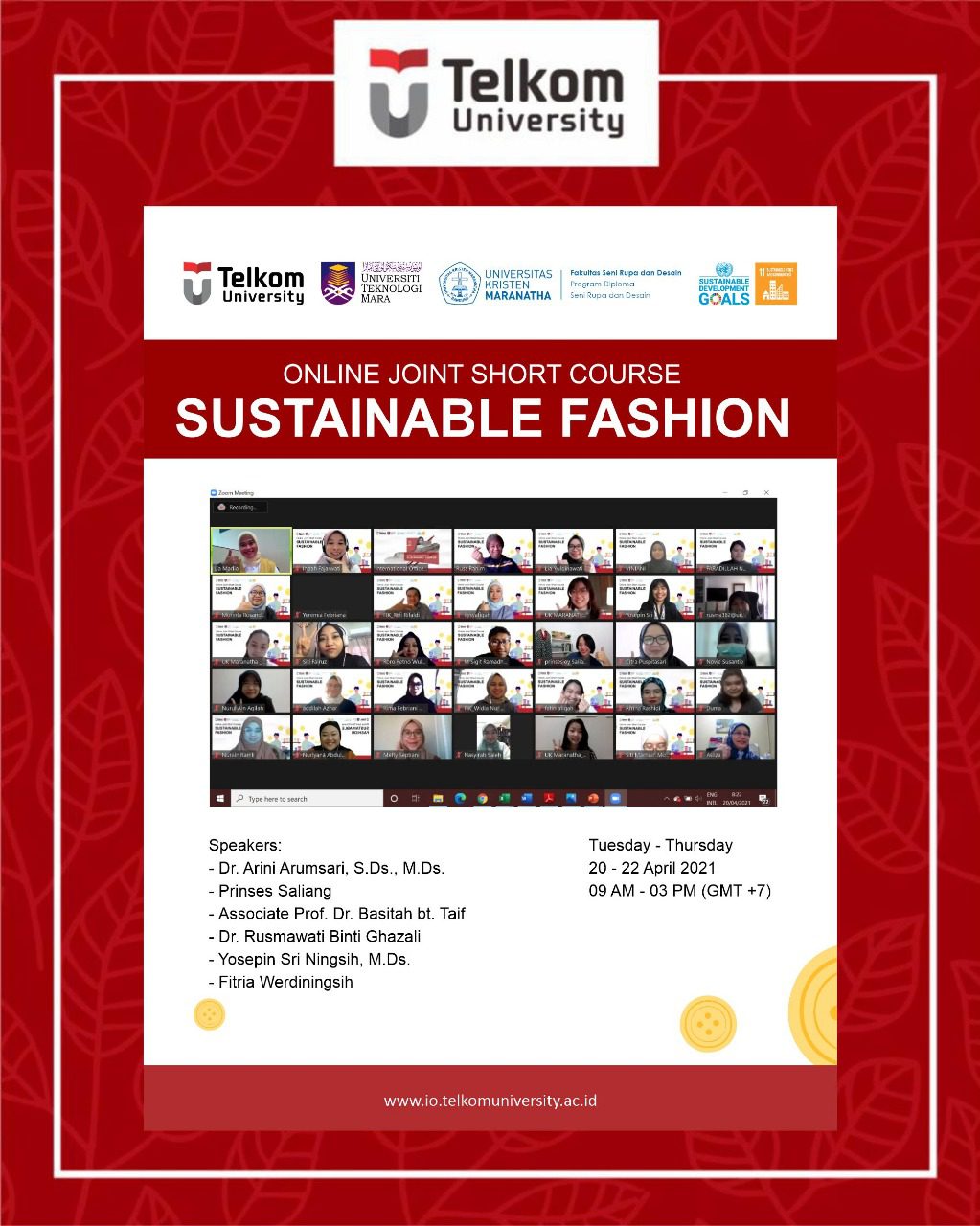
Fashion that Ethical and Sustain, Online Joint Short Course
Fashion that Ethical and Sustain, Online Joint Short Course. Telkom University, this time, collaborates with Universiti Teknologi MARA-Malaysia and Maranatha Christian University-Indonesia to hold the Online Joint Short Course under the topic “Sustainable Fashion”. This Online Joint Short Course is designed in three days, starting from Tuesday, April 20th to Tuesday, April 22nd, 2021 where the students from three universities can be exposed to online lectures, discussion session, and project presentation. During the program, the students who are students from Fashion Study Program will learn about “Sustainable Fashion” including Fashion Design Ethics, Upcycling Material for Fashion Accessories, Natural Dyes, and Sustainable Aspect in Creating Sumba Textile, presented by several excellent lecturers from three universities: Telkom University, UiTM, and Maranatha Christian University. Besides, on the last day, before student project presentation, there is sharing session on Sustainable Fashion Industry by Ms. Fitria Werdiningsih, a LAWE Program Manager.
On the 1st day of the program, opening ceremony was employed to officially open the Online Joint Short Course, attended by representatives from those three universities, including:
- Dr Roro Retno Wulan, Dean of Faculty of Creative Industry, Tel-U
- Professor Ts. Dr. Ruslan Abdul Rahim, Dean of the Faculty of Art & Design, UiTM
- Yosepin Sri Ningsih, Head of Art & Design Study Program, Maranatha Christian University
Oh their opening remarks, they expressed their gratitude to finally implement this collaboration which they believe can enrich students’ knowledge and experience. Likewise, this collaboration can be also a bridge to other joint program.
Fashion that Sustain
The topic “Sustainable Fashion” for this program aims to provide awareness to students in particular, who someday are expected to become fashion designers or fashion industry practitioners to be more aware of the use of environmentally friendly materials and techniques. As we know that in making a fashion product, natural and chemical materials are needed which often damage the environment. Not to mention that, later on when that fashion product is no longer used it will become waste that is difficult to compose. Therefore, through this program we are expected to know more on how to utilize natural materials in the manufacture of fashion products and minimize those waste.
From the presentation of Ms. Dr Arini Arumsari and Ms Prinses Saliang, we now knew that behind the fashion we wear, the glamorous fashion one, there are ugly faces that we should be able to slowly change to become as beautiful as the fashion itself. Fashion is identical with the word glamor, but there are still many workers who don’t feel that way. There are still many labors and fashion craftsmen who are still under the word prosperous, many materials that damage the environment, and there are also many fashion waste that endanger the environment. Therefore, the awareness of designers and consumers is needed to pay more attention to the use of materials and waste management.
In term of waste management, Ms. Saliang shared three methods to support zero waste: Recycle, Reuse, and Refashion. Now we can use the trend of mixed and match fashion by using old clothes, or we can also refashion those fashion products to be a brand new one. Regarding the environmentally friendly materials, natural dyes can be one of the solutions. Even recycle materials such as fish scales can be an alternative media for textile surface embellishments. There are still craftsmen in some areas who still use traditional techniques and natural materials, such as craftsmen from Sumba who make Sumba woven. Those craftsmen need to be appreciated and their traditional techniques need to be preserved for future sustainable fashion. As did the Terasmitra team and the LAWE team, they are the social entrepreneurs, who care about the preservation of traditional woven and also the welfare of its craftsmen by collaborating with them to create fashion business and provide training related to the future fashion industry.
At the end of the program, 3 groups were selected to be the best presentation in the student project presentation. Congratulations to the participants from groups 3, 4, and 5 who succeeded in presenting their project, which is expected to be their first step to become more aware of sustainable fashion. Good job, guys!(IO)***

